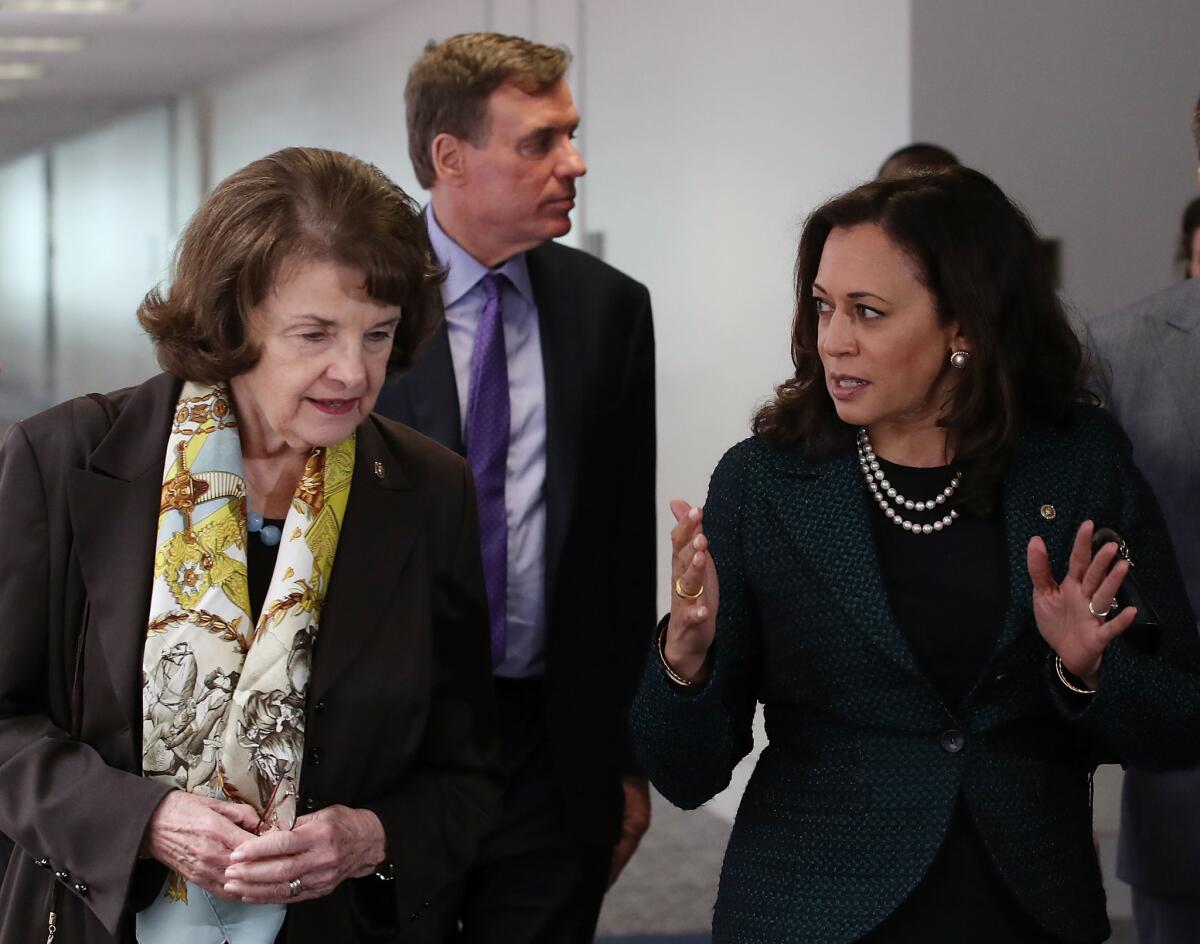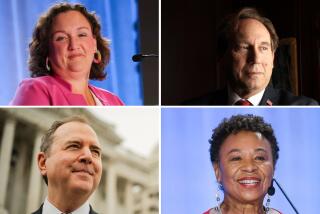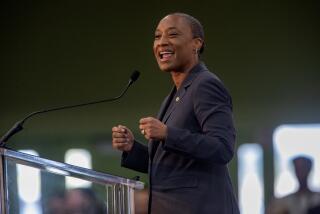Barrett confirmation hearing may pressure Feinstein, Harris to subdue their political instincts

California’s Democratic senators forged their political brands during high-profile Supreme Court confirmation hearings like the one to be held next week with Judge Amy Coney Barrett.
But as they prepare to quiz President Trump’s third nominee to the bench just three weeks before the presidential election, Sens. Dianne Feinstein and Kamala Harris face distinct challenges that may call for them to rein in their natural political instincts.
Feinstein, the top Democrat on the Senate Judiciary Committee, needs to prove to skeptical progressives that her preference for bipartisanship and comity won’t prevent her from taking an aggressive stance against Republicans — not only during a confirmation process most Democrats view as illegitimate, but as chair of the panel next year if Democrats take the Senate majority in 2021.
In contrast, Harris, now the Democratic vice presidential nominee, may be tempted to tone down her prosecutorial style. Known for tough questioning of judicial nominees and other Senate witnesses, Harris will have to balance expectations for a gotcha viral moment with the demands of a presidential ticket that is leading in the polls and eager to avoid any missteps or undue risks.
For Feinstein, the challenge is how much sand to throw into the gears of the Barrett confirmation process. She is facing pressure from those who say Democrats must do more than merely voice their objections to the GOP push to fill the vacancy as voting in the presidential election is already underway.
“If you issue a litany of statements that the process is illegitimate, but you go through business as usual for your actions, then the record reflects that you consider the process as legitimate,” said Adam Jentleson, who was an aide to former Senate Majority Leader Harry Reid (D-Nev.).
One option would be for Democrats to boycott the committee vote, expected on Oct. 22. If some Republican senators are absent because of COVID-19 quarantines — currently three GOP senators have tested positive — Democrats could challenge whether they have a quorum in committee or on the Senate floor.
Other committee Democrats have refused to meet with Barrett in a sign of protest. But Feinstein and six other Democrats on the committee held meetings over the phone with her, some as recently as Wednesday.
Feinstein, reelected to her sixth term in 2018, is under growing scrutiny from fellow Democrats for her work on the committee. There is lingering frustration with how she handled the Kavanaugh hearings, including agreeing to Christine Blasey Ford’s request for anonymity after the Palo Alto professor privately disclosed the allegation that Kavanaugh assaulted her when they were teenagers, a charge he denied. Ford eventually came forward to testify voluntarily.
Feinstein is also widely blamed for mishandling the questioning of Barrett’s religious views during Barrett’s 2017 confirmation hearing as an appellate judge. Feinstein told the nominee, “The dogma lives loudly within you,” a phrase that galvanized conservative Catholics and opened the door to GOP complaints that Democrats opposed her because of her religion.
Some Democrats have quietly gone to Senate Minority Leader Charles E. Schumer (D-N.Y.) in recent months about replacing Feinstein next year on the Judiciary committee with a senator who is younger and more aggressive, as first reported by Politico last month. Rank-and-file members have held private discussions about whether seniority is the best way to choose the leaders of committees. If Democrats win the majority in the Senate in 2021, Feinstein would be next in line to lead the powerful panel. She refused to say whether she would seek the post.
Feinstein declined an interview request, but in response to written questions, she pushed back on the idea that she has been meek.
“I’ve neither seen nor been told any steps we haven’t taken that we should be taking,” she wrote. “Everything that can be done, we’re doing. And I’m going to keep fighting to hold Justice [Ruth Bader] Ginsburg’s seat open until after the inauguration so the American people are given a voice in selecting our next justice.”
She declined to release details on the Democrats’ procedural strategy. She associated herself with the grass-roots opposition to Barrett’s confirmation, but said there are limits on what she and Democrats can do if Republicans have the votes.
“I share the passion we’re seeing. A lot is at stake for the American people with this nomination,” she said. “Unfortunately, at the end of the day, the Senate allows no real tools to stop this process as long as the majority side has the votes to push it through. It really shows why elections are so vitally important.”
Progressive Democrats insist Barrett’s fate is not sealed. They point to past examples when Republicans theoretically had the votes, but buckled under public pressure, such as the unsuccessful GOP effort to repeal Obamacare in 2017.
During the Barrett hearing, Democrats plan to argue she would almost certainly vote to invalidate the Affordable Care Act and undo abortion rights.
“What we’re looking for in the Senate hearings is for the senators to conduct themselves in a way that really underlines the problems with the candidate for the Supreme Court,” said Amar Shergill, chairman of the California Democratic Party’s progressive caucus.
As the most junior Democratic senator on the Judiciary Committee, Harris will probably be last on the list of questioners. But no doubt she’ll be among those most closely watched.
During Justice Brett M. Kavanaugh’s confirmation fight, she had standout moments, such as an abortion-related question about whether he could cite any law that gives government “the power to make decisions about the male body.” She had similarly tough encounters in hearings with Atty. Gen. William Barr, his predecessor Jeff Sessions and John Kelly, then the White House chief of staff.
At times, however, Harris’ questioning has been criticized for going too far, leading to a backlash that she was badgering witnesses, cutting them off and implying wrongdoing through her questions without providing actual evidence. For instance, she asked Kavanaugh whether he ever discussed special counsel Robert S. Mueller III’s investigation of Russian election meddling and obstruction of justice with any employees of a particular law firm, a line of specific questioning that suggested she had evidence that he had done so. Kavanaugh appeared caught off guard. Yet nothing more ever became public about it.
Less than a month away from the election, the Biden camp no doubt wants to avoid any high-profile gaffes during the Barrett hearing. On the other hand, supporters cite Harris’ strong questioning skills as one of the reasons she is the vice presidential nominee.
“Her entire career is about taking risks,” said Steve Haro, a former chief of staff to Feinstein who is now a lobbyist. “She’s going to show why Joe Biden chose her to be our vice presidential nominee.”
More to Read
Get the L.A. Times Politics newsletter
Deeply reported insights into legislation, politics and policy from Sacramento, Washington and beyond. In your inbox three times per week.
You may occasionally receive promotional content from the Los Angeles Times.







